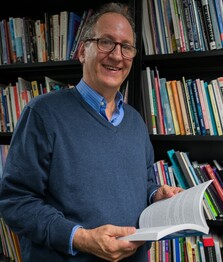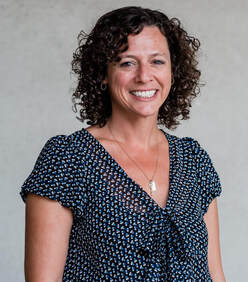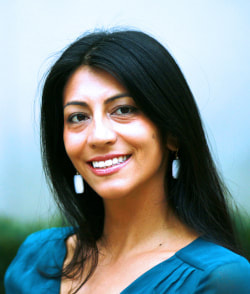OCEAN Update: A Model for Inclusion
Now in its third year, the OCEAN partnership between the UCI School of Education and TLC Public Charter School is generating novel research into ways that technology can foster an inclusive environment for culturally and linguistically diverse students with disabilities
In the past, technology – be it an assistive technology, a hardware such as an iPad or Chromebook, or software such as YouTube or Zoom – was typically seen as a tool that could help foster independence for students with disabilities.
An OCEAN research team is shifting that focus by exploring how digital technologies can be collaboratively used to create not only independence, but “interdependence.” That is, instead of focusing solely on the 1:1 uses of digital technologies, the team is looking at how technology can be used in community by students, teachers, paraprofessionals, and families to promote inclusion.
“Something we learned through this research is how important the social connections, the social relations, and the social networks are for this model of inclusion,” said Professor Mark Warschauer, member of the OCEAN research team. “If you’re trying to help a child with technology, then it isn’t just about the technology, but instead it’s this ‘It takes a village’ approach.”
“What we are seeing at the school is that they have a collaborative approach to how they engage with each other and technology,” said Yenda Prado, doctoral candidate and member of the OCEAN research team. “The goal of our research is to understand the ways that technology facilitate and engage learners and amplify student agency and voice.”
The UCI School of Education and TLC Public Charter School have partnered with each other since the creation of OCEAN in fall 2018. OCEAN – the Orange County Educational Advancement Network – is a network of research-practice partnerships between the School of Education and K-12 schools in Orange County. At each site, a School of Education faculty member and doctoral student work with school leadership to identify the greatest needs and goals of the school, and in turn conduct research that will positively impact both the school and greater Orange County.
An OCEAN research team is shifting that focus by exploring how digital technologies can be collaboratively used to create not only independence, but “interdependence.” That is, instead of focusing solely on the 1:1 uses of digital technologies, the team is looking at how technology can be used in community by students, teachers, paraprofessionals, and families to promote inclusion.
“Something we learned through this research is how important the social connections, the social relations, and the social networks are for this model of inclusion,” said Professor Mark Warschauer, member of the OCEAN research team. “If you’re trying to help a child with technology, then it isn’t just about the technology, but instead it’s this ‘It takes a village’ approach.”
“What we are seeing at the school is that they have a collaborative approach to how they engage with each other and technology,” said Yenda Prado, doctoral candidate and member of the OCEAN research team. “The goal of our research is to understand the ways that technology facilitate and engage learners and amplify student agency and voice.”
The UCI School of Education and TLC Public Charter School have partnered with each other since the creation of OCEAN in fall 2018. OCEAN – the Orange County Educational Advancement Network – is a network of research-practice partnerships between the School of Education and K-12 schools in Orange County. At each site, a School of Education faculty member and doctoral student work with school leadership to identify the greatest needs and goals of the school, and in turn conduct research that will positively impact both the school and greater Orange County.
/
Something we learned through this research is how important the social connections, the social relations, and the social networks are for this model of inclusion. If you’re trying to help a child with technology, then it isn’t just about the technology, but instead it’s this ‘It takes a village’ approach.”
- Mark Warschauer Professor & Director, Digital Learning Lab /
|
TLC Public Charter School was founded in 2018 by School of Education alumna Jessica Tunney (Ph.D. ’16) as a model of inclusive education, community impact, and instructional innovation for equity. TLC is unlike any other school in Orange County, with diverse-by-design classrooms that bring together culturally and linguistically diverse students, gifted students, students who develop typically, and students with disabilities in a learning environment built for interest-based learning, the arts, and socio-emotional growth and care. As a learning organization, the school is structured for TLC staff to regularly collaborate, co-plan, and develop the collective expertise needed to meet new and future challenges of educating students in an increasingly complex and connected world.
“TLC is a place where each child matters, every child is included, and all children can learn, ask questions, and develop their own unique passions and interests,” said Tunney, who serves as the school’s executive director and founding principal. “Participation in the OCEAN network is a key pathway for TLC to live out its mission of creating new knowledge to making real progress in the classroom through authentic inclusion and an enriched educational experiences for every child – especially those who have been persistently marginalized and shut out for far, far too long.”
The research from the OCEAN partnership is being shared nationwide; three different papers will be presented at the upcoming American Educational Research Association (AERA) Conference, and a book authored by Prado and Warschauer detailing the research is forthcoming from MIT Press.
/
Participation in the OCEAN network is a key pathway for TLC to live out its mission of creating new knowledge to making real progress in the classroom through authentic inclusion and an enriched educational experiences for every child – especially those who have been persistently marginalized and shut out for far, far too long.
- Jessica Tunney (Ph.D. '16) Founding Principal & Executive Director, TLC Public Charter School /
|
The partnership has grown organically and over time. In the partnership’s first year, the team was focused on observation and understanding how TLC’s classrooms operated. In the second year, the focus shifted to technology. In this third year, the focus has been on supporting students in remote learning.
To assist in remote learning across OCEAN partner sites, OCEAN last fall established an infrastructure of learning pods, in which UCI undergraduates are paired with K-12 students and families. To date, the project has matched undergraduate students with more than 125 students and families.
“TLC is all about social and emotional development, and about peer-peer engagement,” Prado said. “These learning pods are designed to support students’ social-emotional learning and facilitate small-group learning. The pods are proving to be an innovative and useful solution for our partner organizations engaged in remote learning during the pandemic."
To assist in remote learning across OCEAN partner sites, OCEAN last fall established an infrastructure of learning pods, in which UCI undergraduates are paired with K-12 students and families. To date, the project has matched undergraduate students with more than 125 students and families.
“TLC is all about social and emotional development, and about peer-peer engagement,” Prado said. “These learning pods are designed to support students’ social-emotional learning and facilitate small-group learning. The pods are proving to be an innovative and useful solution for our partner organizations engaged in remote learning during the pandemic."
/
“We are looking to develop core practices and behaviors necessary to build an inclusive environment, and then working to support school districts and organizations in cultivating and replicating those. Additional funding would help develop a framework for inclusion we could bring into other districts, schools, and organizations.”
- Yenda Prado Doctoral Candidate, UCI School of Education /
|
"The dialogic nature of the OCEAN network provides a framework and structure for researchers and practitioners to come together in taking on the 'big problems' of the field," Tunney said. "Innovations developed with the voices of researchers, practitioners, and learners included hold the potential for improvement for students and families, as well as organizations."
TLC offers another particularly unique research opportunity. A majority of existing research on disability and technology has focused on students from majority white, higher-resourced, families, Warschauer explained. TLC, on the other hand, is home to a linguistically and culturally diverse school community that reflects the demographics of Orange County.
TLC offers another particularly unique research opportunity. A majority of existing research on disability and technology has focused on students from majority white, higher-resourced, families, Warschauer explained. TLC, on the other hand, is home to a linguistically and culturally diverse school community that reflects the demographics of Orange County.
|
Moving forward, the OCEAN research team wants to focus on developing a model for inclusion and disseminate it to additional schools, districts, and other non-academic organizations interested in being more inclusive.
It’s a mission that TLC and the School of Education have had since they first partnered with one another. “We are looking to develop core practices and behaviors necessary to build an inclusive environment, and then working to support school districts and organizations in cultivating and replicating those,” Prado said. “Additional funding would help develop a framework for inclusion we could bring into other districts, schools, and organizations.” |
More InformationTake a deeper dive into OCEAN and the many other ways the UCI School of Education is supporting the K-12 community before, during, and after the pandemic.
|
"Advances in technology can open new opportunities for schools, and in the long-term, I hope this project highlights the ways school-university partnerships can spark innovation in the use of technology at school," Tunney said. "By bringing together practitioners and researchers, the OCEAN network has the benefit of access to a much broader range of insights and new ideas."




